Photo: Michael L. Rivera Avilés
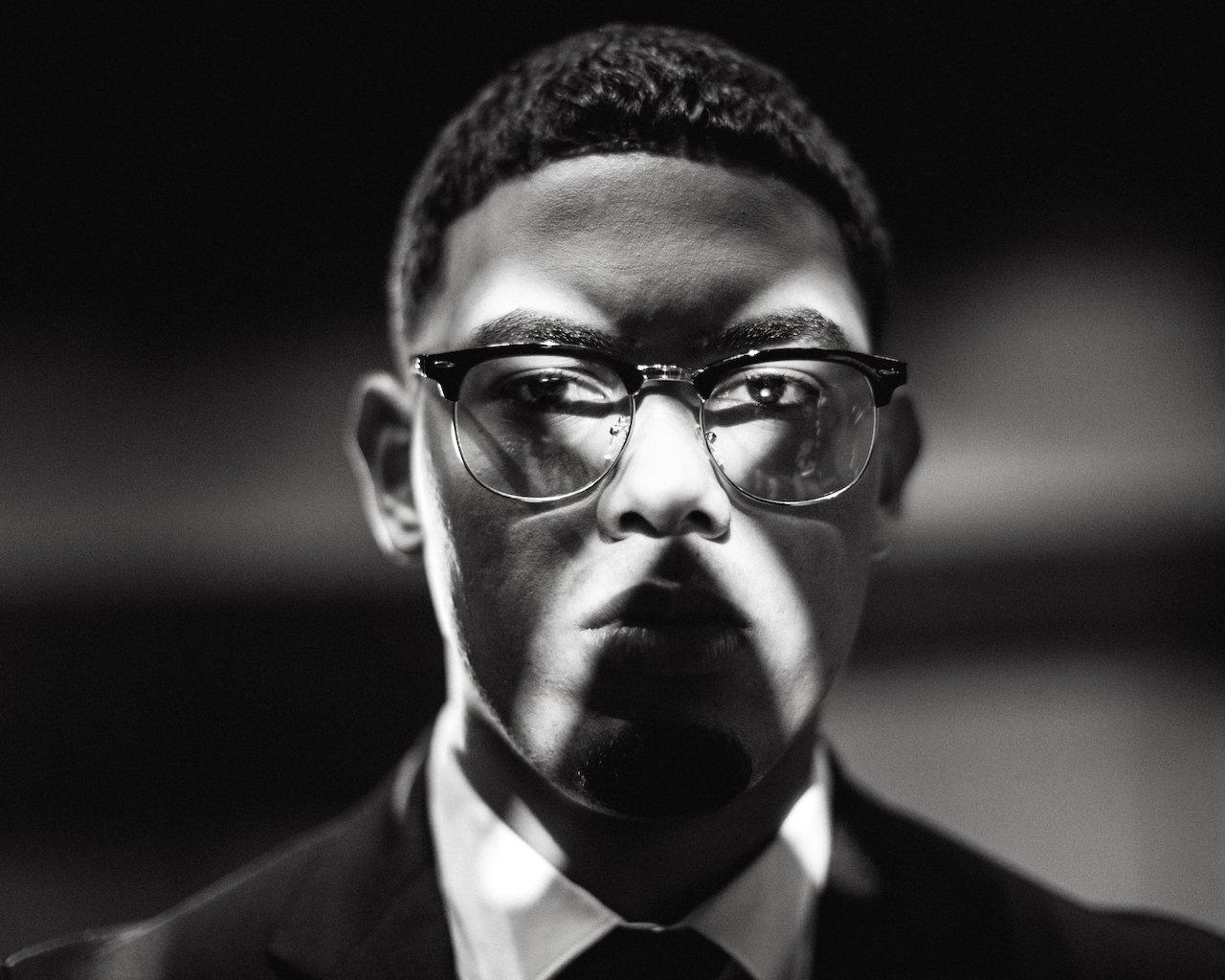
Myke Towers
news
EXCLUSIVE: Listen To Myke Towers Address Racism & Police Brutality On "MICHAEL X"
The Afro-Latino rapper expresses his thoughts and outlines his responsibility through his hip-hop track and visual inspired by Malcolm X
Myke Towers recognizes that silence is a problem.
"Soy parte del problema, si estos temas no los sacos," he raps in Spanish on "MICHAEL X." Translation: "I'm a part of the problem if I don't bring these issues up."
Towers, of course, is referring to the conversations stemmed from the police killing of George Floyd. As an Afro-Latino born in Puerto Rico who was deeply influenced by hip-hop culture and Black rappers like Jay-Z, who he named his son after, Towers, born Michael Torres, feels the need to support the struggle against police brutality and racism.
"For me, being a Latin artist who has been heavily influenced by Black culture, it is important to show my support and stand in solidarity with the African American community for what is right, what is humane," he told GRAMMY.com in a statement.
<style>.embed-container { position: relative; padding-bottom: 56.25%; height: 0; overflow: hidden; max-width: 100%; } .embed-container iframe, .embed-container object, .embed-container embed { position: absolute; top: 0; left: 0; width: 100%; height: 100%; }</style><div class='embed-container'><iframe src='https://www.youtube.com/embed/hiV8QR4QHO0' frameborder='0' allowfullscreen></iframe></div>
He expresses his thoughts and outlines what he feels is his responsibility as an artist with a platform on his track by channeling one of the most influential Black leaders in history. "MICHAEL X"'s powerful visual opens with Malcolm X's speech adressing police brutality in Los Angeles on May 20, 1962.
Dressed in a black-and-white suit, Towers evokes X (at one point standing in front of a podium like X does in his famous 1962 Los Angeles speech), letting go of his usual lifestyle lyrics and trap/reggaeton beat. Instead, he adopts a more serious tone over a traditional hip-hop sound that takes him back to his roots.
"I wrote this song to really get so much I had inside me, out. I needed to say what you hear. I needed the world to hear my point of view as an Afro-Latino," he said.
And so he does, using lyrics to reference slavery, immigration, 9/11, politics—from police brutality to Puerto Rico's controversial Governor Wanda Vázquez Garced—Black pop culture, including Wakanda, home of Black comic book hero Black Panther, and Kobe Bryant. In one verse, Towers also references Latin pop culture, using witty lyricism to reference fellow Puerto Rican rapper Rene Pérez Joglar, a.k.a Residente.
Beyond sharing his perspective, Towers uses "MICHAEL X" to uplift Black people and share his pride. "I like seeing how the beautiful faces of my Black people cheer up," he raps in a verse.
The powerful song began as just thoughts but quickly became something more. "At first, my intention was really penning down some thoughts and sentiments but then the lyrics just began flowing and before I knew it, it was a full song," he said. "I knew I had to record it. It was an intense and emotional moment you know?"
The rapper feels Floyd's death, who he mentions in the song, is a catalyst for change. "While unfortunate, the death George Floyd woke the world up. It is shaking its core," he said. "I feel in life everything is timed out and aligns how it is meant to be aligned, and us being in quarantine has really made us open our eyes."
Towers feels strongly about being a part of a generation that enacts change.
"The death of George Floyd has impacted the world very deeply," he said. "No man, woman or child should have to worry about being treated unjustly just because of the color of their skin. As a younger generation, it is our responsibility to TAKE part and BE part of the change."
Hear the full song above.
Naeem Talks New Album 'Startisha,' Creativity In Quarantine And The Need For Change In America
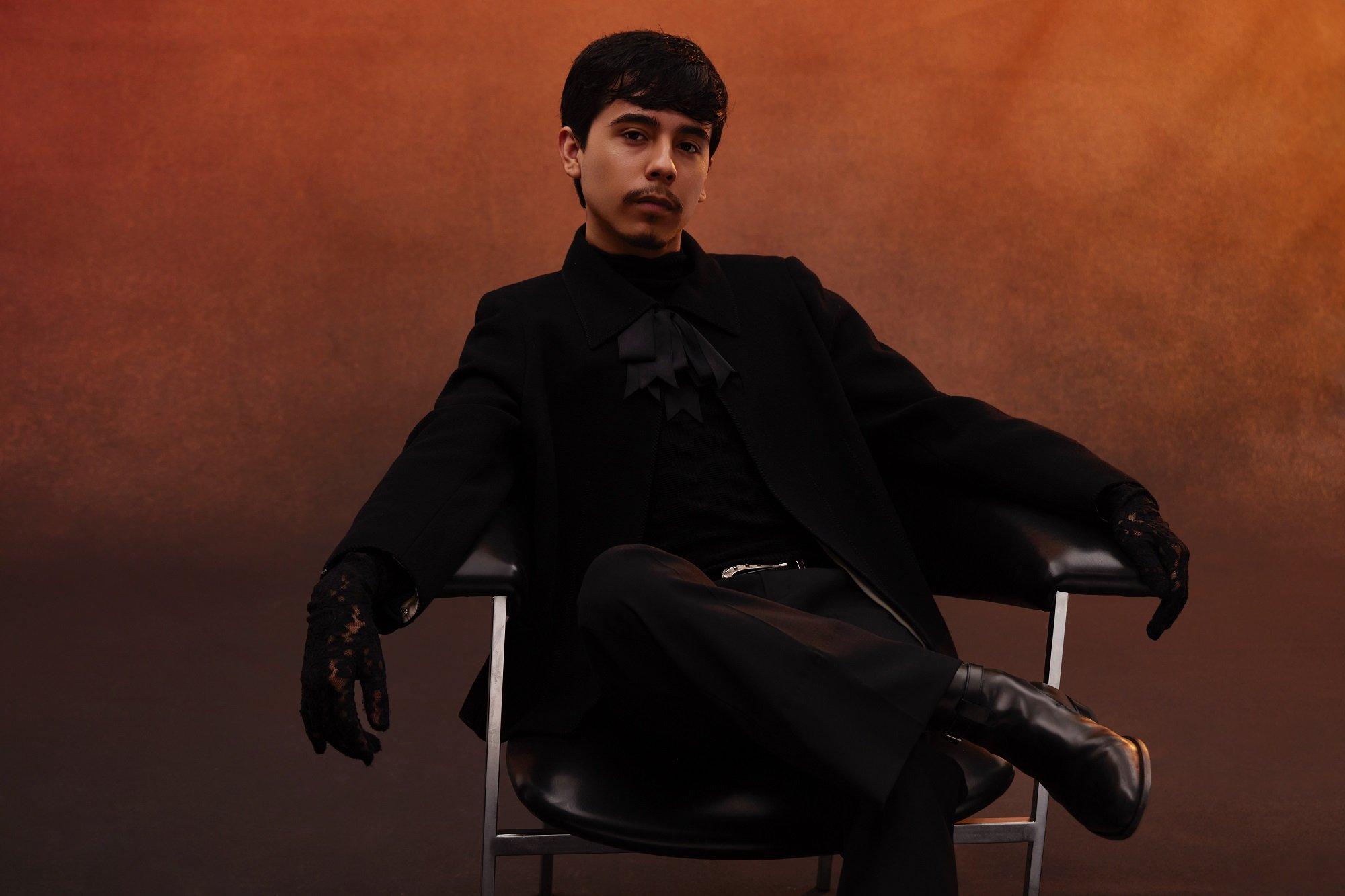
Photo: Le3ay Studio
interview
On 'Mirada,' Ivan Cornejo Redefines The Sound Of Sad Sierreño And Helps Fans Heal Through Music
Ivan Cornejo has always found solace in music. With his new LP, 'Mirada,' he wants his fans to experience that sense of belonging: "I write about emotions that everyone goes through or has been through."
Within the landscape of Música Mexicana, Ivan Cornejo is a rarity.
The 20-year-old California native stands out as one of the most intriguing acts in a genre represented by artists known for their flashy looks and music. Soft-spoken and warm, Cornejo's gentle demeanor effortlessly translates into his music and on-stage persona and musical productions.
Cornejo's songs and lyrics are far removed from the "corridos tumbados" that have taken over global charts. Fans have dubbed the Mexican American singer the "Gen Z therapist" because of his heartbreak-influenced lyrics and dexterity in creating the ethereal, melancholic sound known as sad sierreño.
With two albums under his belt, Cornejo makes his major label debut with Mirada, released on July 18 via Zaragoza Records / Interscope. The album features the wistful, sad sierreño sound that made Cornejo famous three years ago with "Está Dañada," a heart-wrenching ballad from his first LP, Alma Vacía (2021).
In the single, which has amassed over 270 million streams on Spotify, Ivan — then 17 — captivated listeners with powerful melodies accompanied by languid and nostalgic vocals, reciting verses filled with maturity beyond his years.
In Mirada, the Música Mexicana breakout star presents 12 solo songs inspired by summer nights, including singles "Aquí te Espero," "Donde Estás," "Baby Please," and "Intercambio Injusto." As with his previous productions, Cornejo makes heartbreak the central theme of his album while guitars and melodies reminiscent of alternative rock take center stage.
While the album doesn’t feature additional artists, Cornejo opened up to collaboration within the studio. The singer, used to collaborating solely with his producer, Frank Rio, encountered a challenge when bringing two additional creatives into the studio.
"The process for this new project was very different," Cornejo tells GRAMMY.com in a Zoom interview from Mexico City. "[Having other] creatives in the studio [resulted] a lot of learning. For example, my producer and I learned a lot from each other; we had constructive disagreements. We heard each other's opinions and learned a lot from this project."
The rising sad sierreño star discusses with GRAMMY.com the creative challenge of Mirada, the artistic boundaries he pushed along the way, the advantage behind bilingual songwriting, and the unexpected singer that influenced his lyrics.
This interview has been edited for length and clarity.
'Mirada' feels very personal, almost like a diary. How would you describe the album's overall theme and feeling?
While writing and recording this album, I wanted it to feel very personal, intimate, and gentle but with a little more uplifting sound.
I wanted the Mirada theme to feel like a nostalgic summer night. I want people to feel like they can play these songs on the beach, with friends, or alone in bed. I wanted it to feel a little euphoric.
The record showcases a blend of Latin and Anglo influences. Tracks like "Baby Please," "Dónde Estás," and "Aquí te espero" have a rock ballad feel. What inspired this fusion?
My influences come through a lot. I remember listening to my sister's and brother's music at eight while my parents would play classical regional Mexican music, like mariachi and corridos. As I grew up and started making music, it meshed into this sad sierreño and this funky Spanish alternative [genre].
The guitar is a staple in your sound. How did it become so central to your musical expression?
I started playing the guitar when I was about seven. I fell completely in love with the instrument. My mom tried to put me in violin classes, and I learned the instrument for a while, but the guitar kept winning me over. I kept learning more and more about the guitar, and around 12, I started learning songs by Radiohead, Arctic Monkeys and Tame Impala, and that's where my music emerged.
Mirada portrays the nostalgia around summer nights. How were those nights for you?
I spent it with my friends, making a bonfire and hanging out at the beach, pool, or jacuzzi.
Those nights when you just put your phone away and let the wind hit you and talk about your feelings, your thoughts are different, that kind of night.
What kind of music did you listen to on those summer nights?
Last summer, I listened to [Bad Bunny’s] Un Verano Sin Ti; [that album] was No. 1 on my playlist.
The year before, I listened to just any vibey music, like Arctic Monkeys, Tame Impala, or Radiohead, when I was alone. Cigarettes After Sex, I listened to them a lot during the summer when I was going to sleep. I always put them on.
You say that each track on this album is pushing the boundaries of your art. In what aspect are you breaking those barriers?
I go back to my last two albums [Alma Vacía and 2022’s Dañado,] and I want to grow as an artist and musician every time I listen to them.
Every time we enter the studio, [my producer] Frank Rio and I try our best to push the limits for ourselves and keep growing as artists. Vocally, musically, instrumentally, [we're] trying our best to make things sound even better.
How do you achieve that? Do you take vocal references from singers you like? Instrumentally, how do you break patterns within the genre?
Sometimes, when I feel something is missing from a song or I want to do something but don't know how to listen to a bunch of music that I think [is similar].
For example, each song on Mirada has a very different style. Depending on the style of the song, I’d listen to genres, styles, or certain ways that artists sing that match that song. Listening to those songs gives me ideas; it's like combining those ideas.
Vocally, for example, if I don't know how to sing a specific word or note, I listen to references and try to combine them in the best way possible.
Your lyrics show maturity beyond your years. Do you consider yourself an old soul?
Yes, I'm an old soul, for sure. When I was 7 years old, my brother would play Johnny Cash songs, and I was right behind him listening to them, downloading all the songs. I remember that for a while, I would go to sleep listening to Johnny Cash for an entire year.
Read more: Meet The Gen Z Women Claiming Space In The Regional Mexican Music Movement
Your song often references therapy sessions, and your fans even consider you the therapist of an entire generation. Do you feel that way?
I never realized my music had that effect. I would read comments saying, "Oh, he healed me" or, "I feel better now," or "he's my therapist, he's my comfort artist." That gave me a lot of joy because my music touched my fans in a very emotional way.
[Those comments] gave me the great idea of naming my [last] tour "Terapia." [Going to a concert] It's like you go to a therapist and you hear them. It all made sense. I hope my music is therapy for a lot of people.
Have you ever been to therapy yourself?
No, I have not. But... I should go. [Laughs.]
How do you articulate emotions clearly in your songs, especially without formal therapy experience?
I write about emotions that everyone goes through or has been through. And I try to write it in a way that sounds fresh and new. Also, melodies are very important because you can say something; depending on the melody, it can change your feelings. I try my best to make it hit the heart melodically and lyrically.
What about Spanish led you to express heartbreak in this language?
I was very inspired by Mexican music because there's something about the sound and the language that is very romantic. For example, there are some phrases in English that you might translate to Spanish, and they sound better in Spanish. Since my first language is English, I can translate them into Spanish and make them sound better and more emotional.
I try to write [songs first] in Spanish, but from time to time, when I get stuck, I start thinking in English. I try to think of just lyrics, and I'm like, okay, that's a cool lyric; how do I make it fit into this? And then, if it doesn't work, I'll try another one and another one until something works, or I get an idea in English, and it just works in Spanish.
[Being bilingual] gives you two perspectives, which helps a lot in the writing process.
What does it mean to you to represent Mexican American culture through your music?
It feels like you're put on a pedestal and have to be a role model. Being part of two cultures is a blessing, because you have two sides and perspectives. I'm very lucky to be here in Mexico and to learn about Mexican culture while still being from the United States and learning from American culture.
Did you feel you fit in when you were growing up?
No. At first, no. I was very shy.
Did music give you that sense of belonging?
Yeah, for sure. It gave me relief as I fit somewhere, and my voice was being heard. [It makes me feel] like I have support and people are [rooting for] me, and it helps me feel a bit understood.
As you enter your twenties and deal with growing fame, do you feel pressure being labeled as the voice of a generation?
I feel the pressure of being a role model, but it's a good kind of pressure. It helps me to make sure that I'm always giving my all. It's almost like motivation; I have to keep trying my best every time to be a role model.
It helps me to ensure that I'm always giving 100 percent and that it's like motivation, too. I have to keep trying my best each time to be a role model.
You sold out the mythical Houston Rodeo in April. How did singing to a crowd of 72,000 make you feel?
[Selena] and Johnny Cash are many of my favorite artists and artists that I look up to [have performed there]. It was a complete honor to play the Houston Rodeo and one of the scariest things I've ever done. [Laughs.]
It was scary at first. But when I realized that there were a good number of fans, I took out my in-ears, and I heard nearly the whole stadium singing back to me. It was such a beautiful and unforgettable night for me. It was a crazy experience.
The Latest News About Latin Music
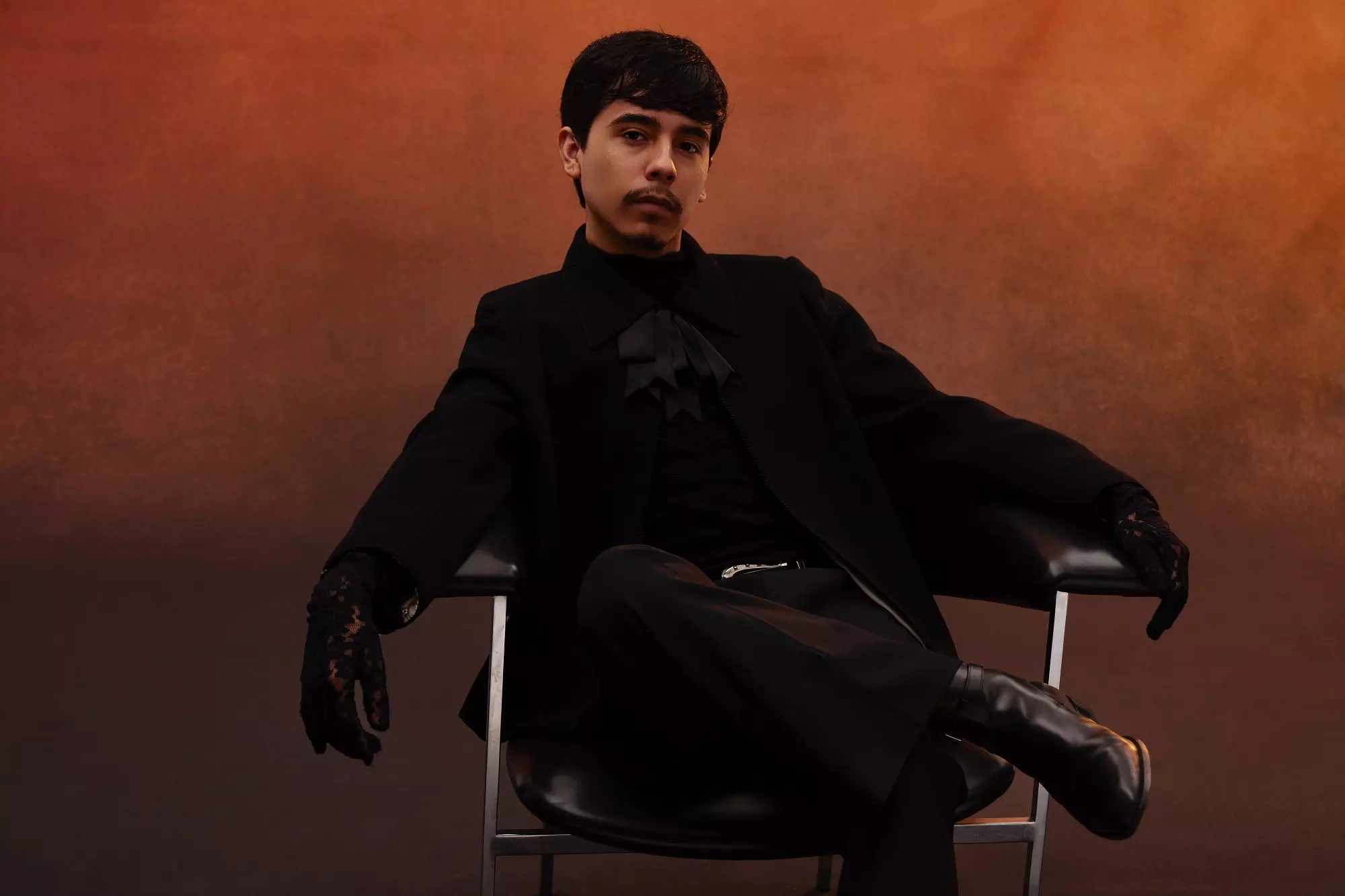
On 'Mirada,' Ivan Cornejo Redefines The Sound Of Sad Sierreño And Helps Fans Heal Through Music
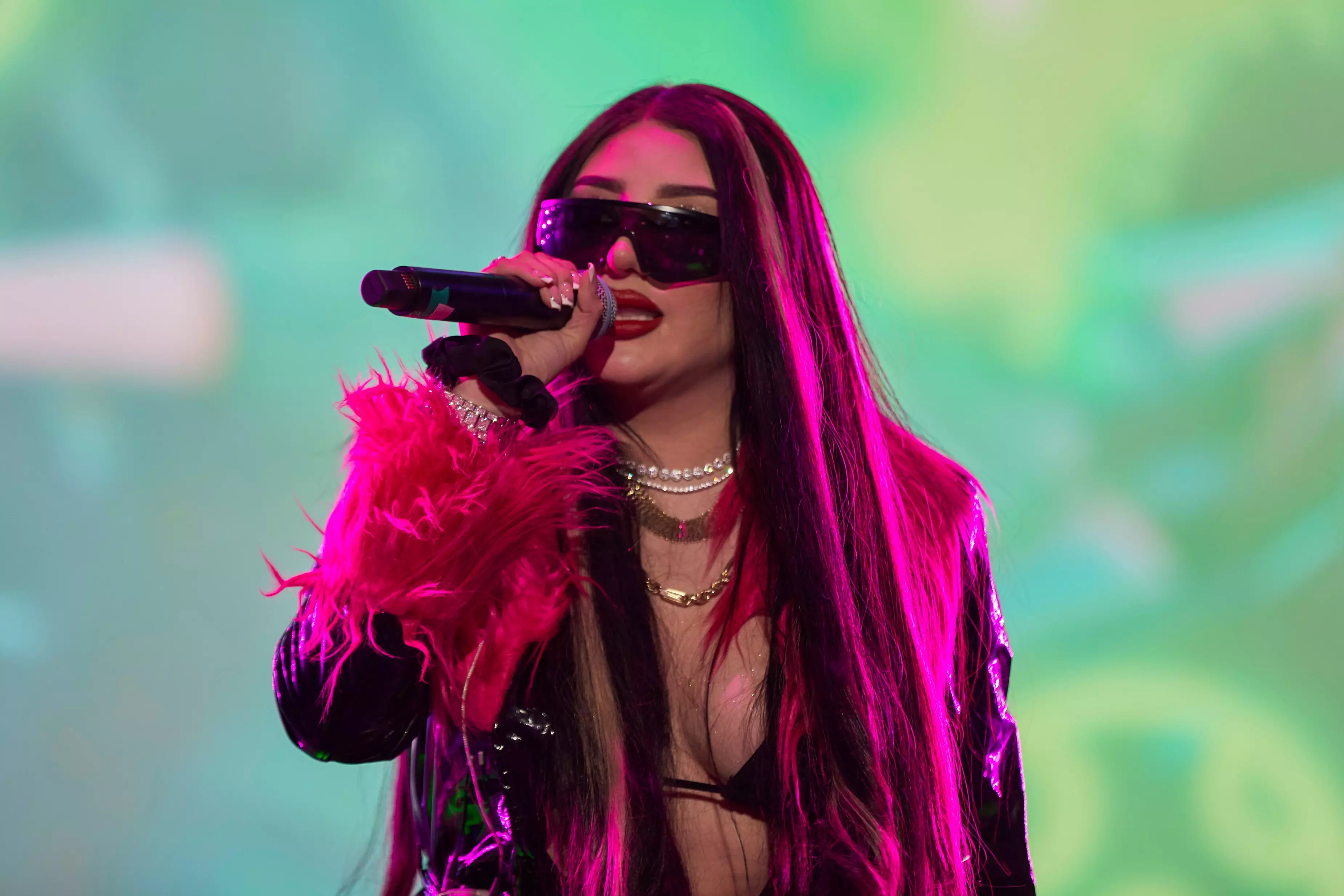
7 Artists Bringing Reggaeton Mexa To The World: El Malilla, Bellakath & More
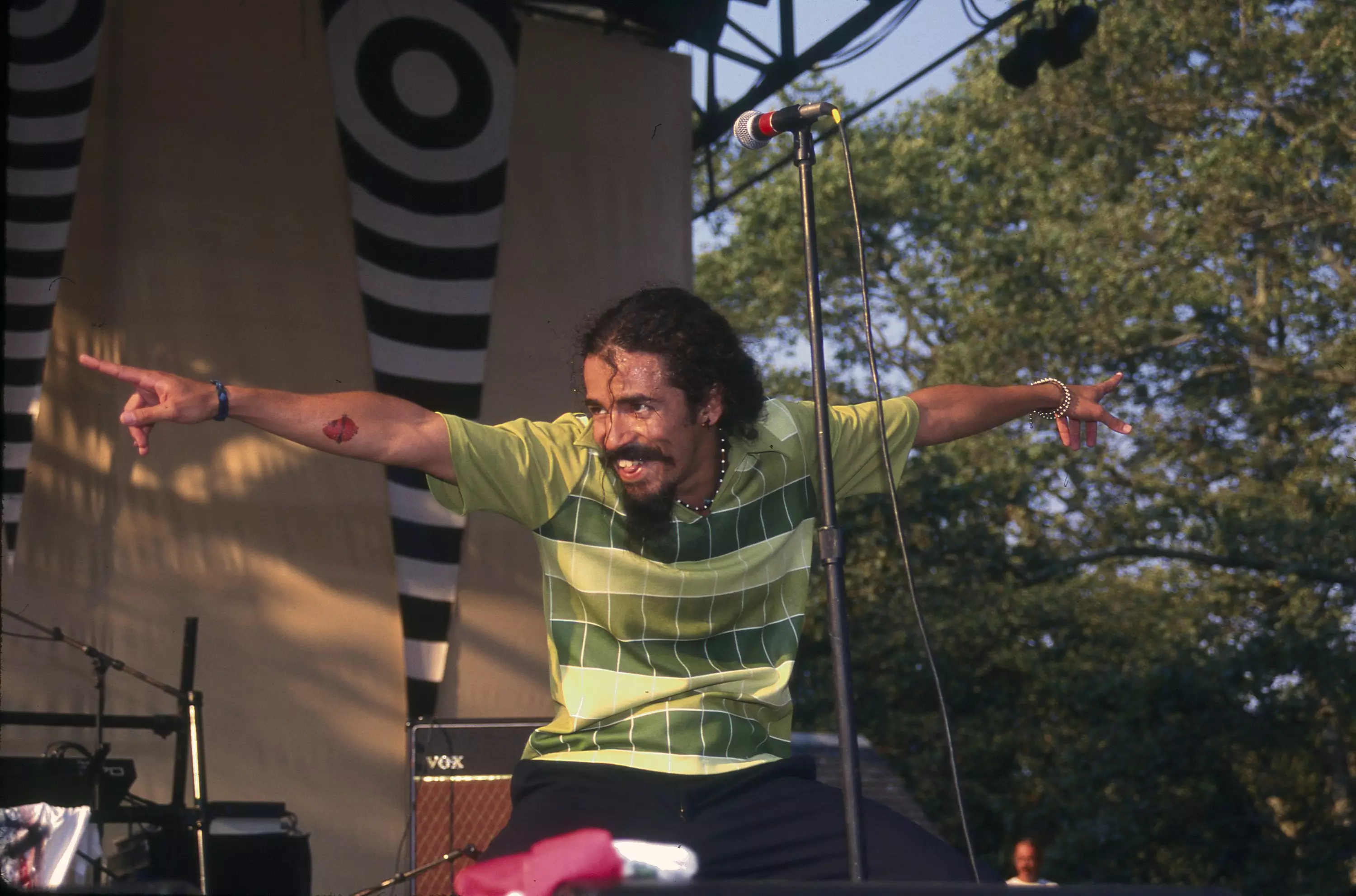
Revisiting 'Re': How Café Tacvba’s 1994 Masterpiece Changed Mexican Music Forever
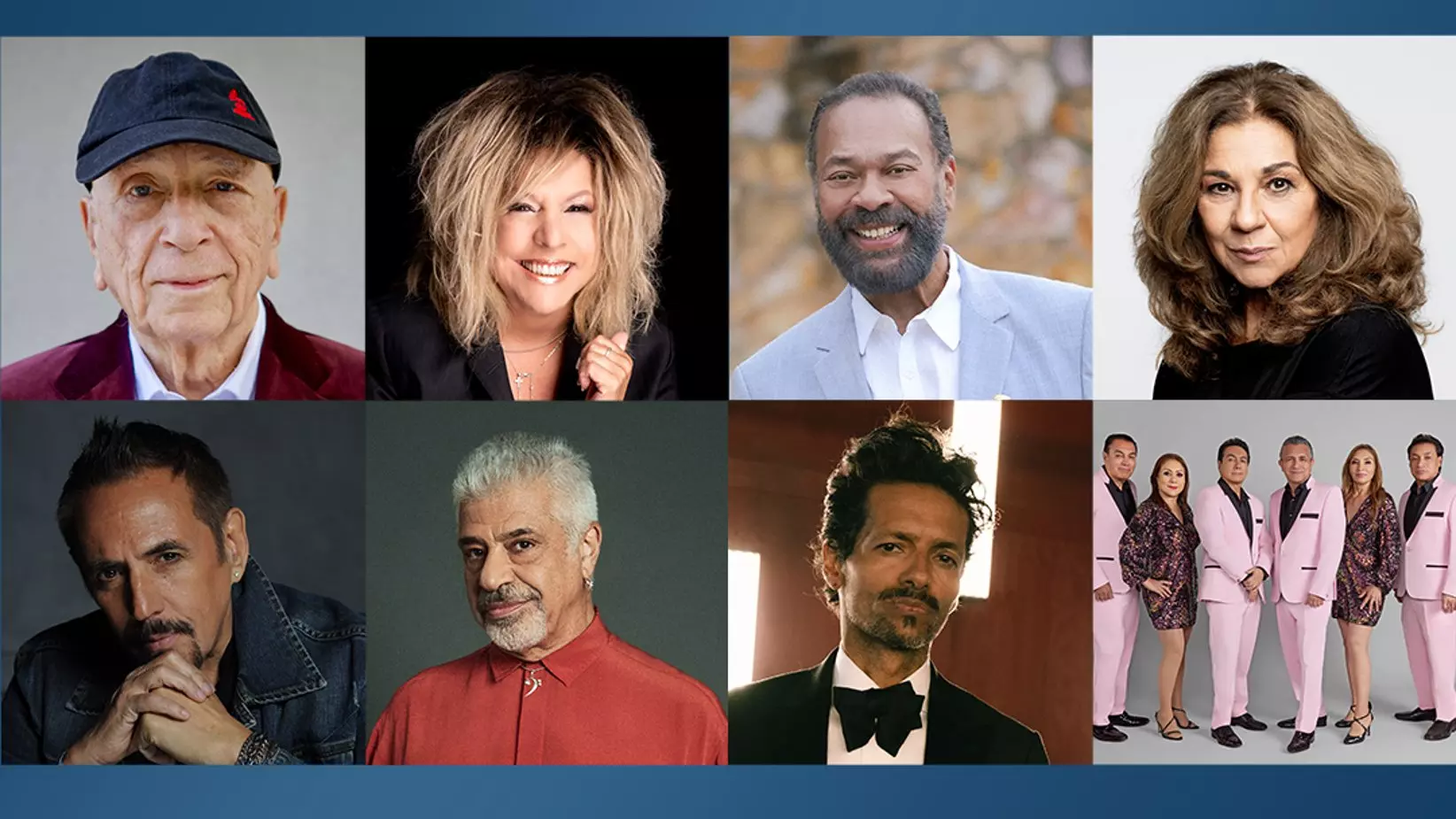
The Latin Recording Academy Announces 2024 Special Awards Recipients: Los Ángeles Azules, Draco Rosa, Albita, Lolita Flores & More
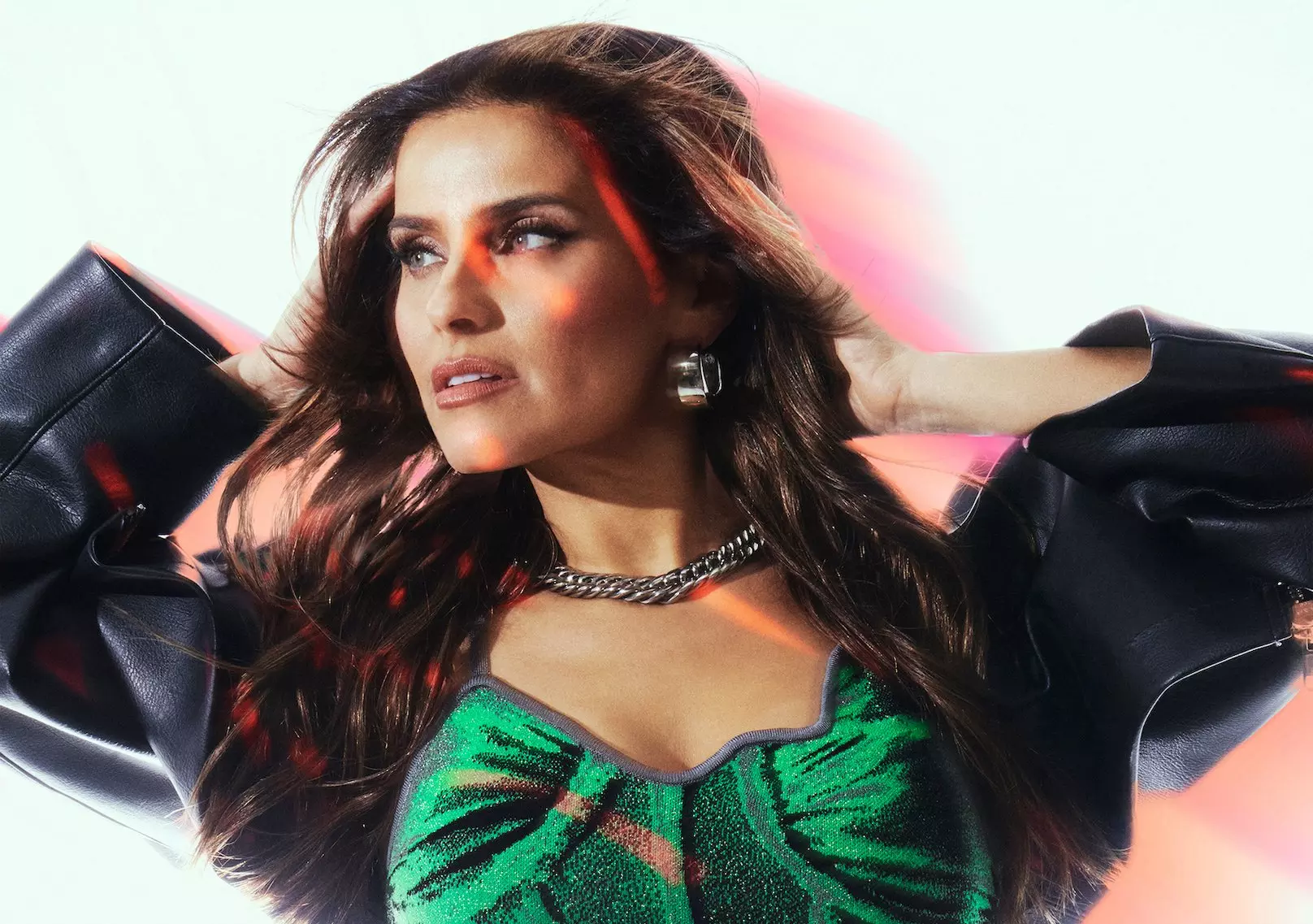
Nelly Furtado On How Remix Culture, ADHD & Gen Z Inspired Her New Album '7'
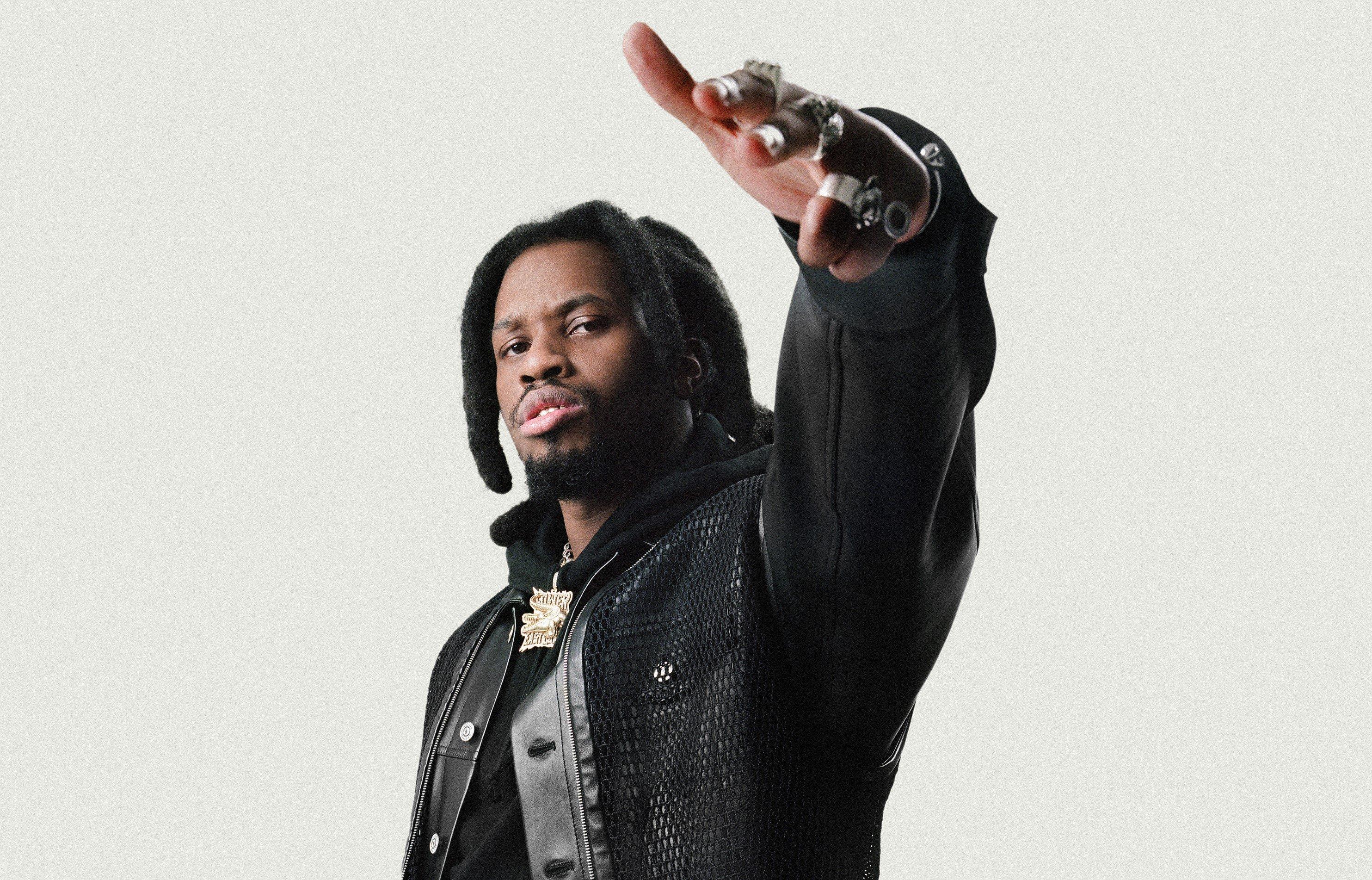
Photo: Giovanni Mourin
interview
Denzel Curry Returns To The Mischievous South: "I've Been Trying To Do This For The Longest"
Over a decade after he released 'King of the Mischievous South Vol. 1,' Denzel Curry is back with 'Vol. 2.' The Miami rapper details his love of Southern hip-hop, working on multiple projects, and the importance of staying real.
Denzel Curry isn’t typically one for repetition. His recent run of critically acclaimed projects have all contrasted in concept and musicality.
The Miami Gardens native has cascaded through boom-bap, synth-soaked trap metal, and cloud rap throughout his catalog. But on his upcoming project, King of the Mischievous South Vol. 2, Curry returns to the muddied, subwoofer-thudding soundscape that he captured on the first installment back in 2012.
Curry was just 16 when he released King of the Mischievous South Vol. 1 Underground Tape 1996]. "I was a kid, man," Curry tells GRAMMY.com. "I was just trying to emulate my favorite rappers at the time who really represented the South. That was pretty much what I was on at the time – the Soulja Slims, the No Limits, but mostly Three 6 Mafia. And then I just put Miami culture on top of that."
Curry first explored the rough-cut "phonk" of Southern acts like DJ Screw and Pimp C as a teenager. His first mixtape, King Remembered Underground Tape 1991-1995, caught the attention of then-rising rapper and producer SpaceGhostPurrp. He shared Curry’s project on his social media accounts, making him an official member of South Florida’s Raider Klan.
Read more: A Guide To Southern Hip-Hop: Definitive Releases, Artists & Subgenres From The Dirty South
The now-defunct group is well behind Curry, who’s ascended from the infancy of his early SoundCloud days to mainstream success. But the rapid-fire delivery and hazy, rough-cut sounds of early Southern rap are still soaked into his musical fibers.
Reignited by the same musical heroes that led to Vol. 1, Curry is comfortable in old sonic form. Vol. 2's lead singles "Hot One" (feat. A$AP Ferg and TiaCorine) and "Black Flag Freestyle" with That Mexican OT fully capture the sharp-edged sound that stretched from Port Arthur, Texas to the Carolinas.
The rapper wanted to go back to the KOTMS series nearly a decade ago, but other projects and outside ventures derailed his return. "I tried to do this thing multiple times," Curry tells GRAMMY.com. "I remember revisiting a [social media post] from 2015 that was like, ‘KOTMS Vol. 2055 is now going to be called Imperial.’ I’ve been trying to do this for the longest."
A string of bouncy, syrup-pouring, and playalistic Southern trap songs led him back to familiar grounds. The new 15-song capsule features Juicy J, 2 Chainz, Project Pat, That Mexican OT, Maxo Kream, and others inspired by the same pioneers that fall below the Mason-Dixon line.
GRAMMY.com sat down with Curry before the release of King of the Mischievous South Vol. 2 on July 19. The "Ultimate" rapper revealed his "Big Ultra" persona, his ability to crank out hits from his bedroom, and his recent discoveries being "outside."
This interview has been lightly edited for clarity and length.
What inspired you to revisit the 'King of the Mischievous South' series?
I was making two projects at once, and there was a through-line from the second half of the project. The second one I was working on kind of just manifested itself into what it is today, 12 years later. And it’s called King of the Mischievous South Vol. 2 because it has the same sonics as the first one.
You mentioned Three 6 Mafia being a big inspiration for Vol. 1. But what about Vol. 2?
The first KOTMS was obviously Three 6 Mafia, and then Lord Infamous was really the person I looked up to, God rest his soul. I get my rap style from him — the rapid flows and stuff like that. You can even hear it on "Walkin’" and "Clout Cobain." But since I’m from Miami, I’m talking about stuff that predominantly happens in Miami. And I’m influenced by Soulja Slim, Master P, DJ Screw, UGK, Trina, Trick Daddy, and Rick Ross.
How did you juggle the two different projects at once?
When I wasn’t working on one project, I was working on the other one. Sometimes I would be working on the same two projects on the same day. I was like, If this one won’t see the light of day until next year, this one has to hold fans over. And the one that was supposed to hold fans over ended up having a crazy through-line.
What were the studio sessions like?
When it came down to the production, I was just making these songs on the fly. A couple came out of Ultraground sessions, but the majority of the songs were made in my bed — just how it was with the first one. "Hot One" was made in my house downstairs, and "Hit The Floor" was made in a random room in an AirBnb. And I think the rest of the songs were made in an actual studio.
I was just flowing, doing my thing, and figuring things out. I was working on one project, and when I wasn’t getting called back to the studio, I was working on another one on the side. The grind didn’t stop.
Was there an element or feature that you really wanted to explore?
I just knew I wanted certain rappers to be featured on [project]. When I was working on "Set It," I originally wanted PlayThatBoiZay. But he didn’t get the record done or whatever the case may be. So, I sent it to Maxo Kream, and he ended up just doing it. And when I made "Wish List," I got Armani White on it. Me and him came off of doing "Goated," so getting that record done was really simple. He pulled up to the studio and he said, "This is tight," and then jumped on the record.
Some stuff didn’t make the cut because we couldn’t get certain people. But the majority of the stuff that made the cut, we were like, "Yes, we did that." Then having people like Ski Mask the Slump God, 2 Chainz, Project Pat, and Juicy J — all these guys played a role. I’m getting people from the South, whether they’re from Texas, Florida, or the Carolinas. And even people outside of the South, like A$AP Ferg and Armani White, they’re all influenced by the same artists.
Learn more: A Guide To Texas Hip-Hop: Definitive Releases, Artists & Events
Your persona on the album, "Big Ultra." Break that down for me.
This is how the name came about — my boy’s nickname is Mr. Don’t Fold. It’s kind of a play on "Mr. Don’t Play," so we came up with "Big Ultra" because I’m doing "ultraground" stuff. It wasn’t on some superpower s—, it’s just me, pretty much. It’s how I wanted to be presented on this tape. It’s just me at the end of the day, it’s no persona.
You’ve been in the rap game for a while. Do you consider yourself a veteran?
I think I’m mostly in a formation period because my best years haven’t even happened yet. I feel like I’m just getting my reps in, preparing myself for my 30s. You know, going through the bulls—, having good times, having bad times.
By the time I get to 30, 35, and 40 — God willing — I could have a fruitful career and not be backtracked by dumb s—. I see myself as someone with a lot to offer because I’m still young.
Do you care about garnering more fame or acclaim? Or is there no need for it?
All my projects are critically acclaimed. The main thing is staying good at what I do. That comes with a lot of effort, a lot of studying, and a lot of work. I take pride in my job and I have fun making music.
I think the hardest part is putting myself out there and being visible. I’m starting to understand that’s what I had to do. I got asked the same question five times in a row about when my album was dropping. I’ve been saying July 19 for the longest. Like, people really haven’t been paying attention? C’mon, bro.
What do you feel is the next step?
I’m just trying to be more visible where the younger generation is at. Most people know me for "Ultimate," "Clout Cobain," or the [XXL Freshman Class] Cypher if I’m being totally real with you. But in due time, everybody has blessings in certain parts of their career. And I’ve been blessed to have a career this long.
All I have to do is just deliver, be real with myself, and do what I have to do. I got to lean into being outside. I didn’t know who messed with me or who liked my stuff until I started going outside and talking to people. You never know who rocks with you until you're outside.
As far as the music and experience, where does the album rank for you?
I didn’t think about where I’d rank this. We had a whole decade of producing great records, and people look forward to the album experience more than the single when it comes to me. This is what it is, and I just want people to enjoy it. It’s not something to put too much effort or thought into. It’s something you can bump into the club, or you could go to a show and turn up to it. That’s where I’m at with it.
Are there any other sounds or genres you want to explore?
It’s going to happen when it’s supposed to happen naturally. But I do want to explore pop and R&B a year from now. I want people to be able to sing my songs and stuff like that.
Latest Rap News & Music

Ice Spice Is The Drill Queen On 'Y2K!': 5 Takeaways From Her Debut Album

Watch Young MC Win Best Rap Performance In 1990

On Rakim's 'G.O.D's Network (REB7RTH)' The MC Turned Producer Continues His Legacy With An All-Star Cast

5 Ways Mac Dre's Final Living Albums Shaped Bay Area Rap

Denzel Curry Returns To The Mischievous South: "I've Been Trying To Do This For The Longest"
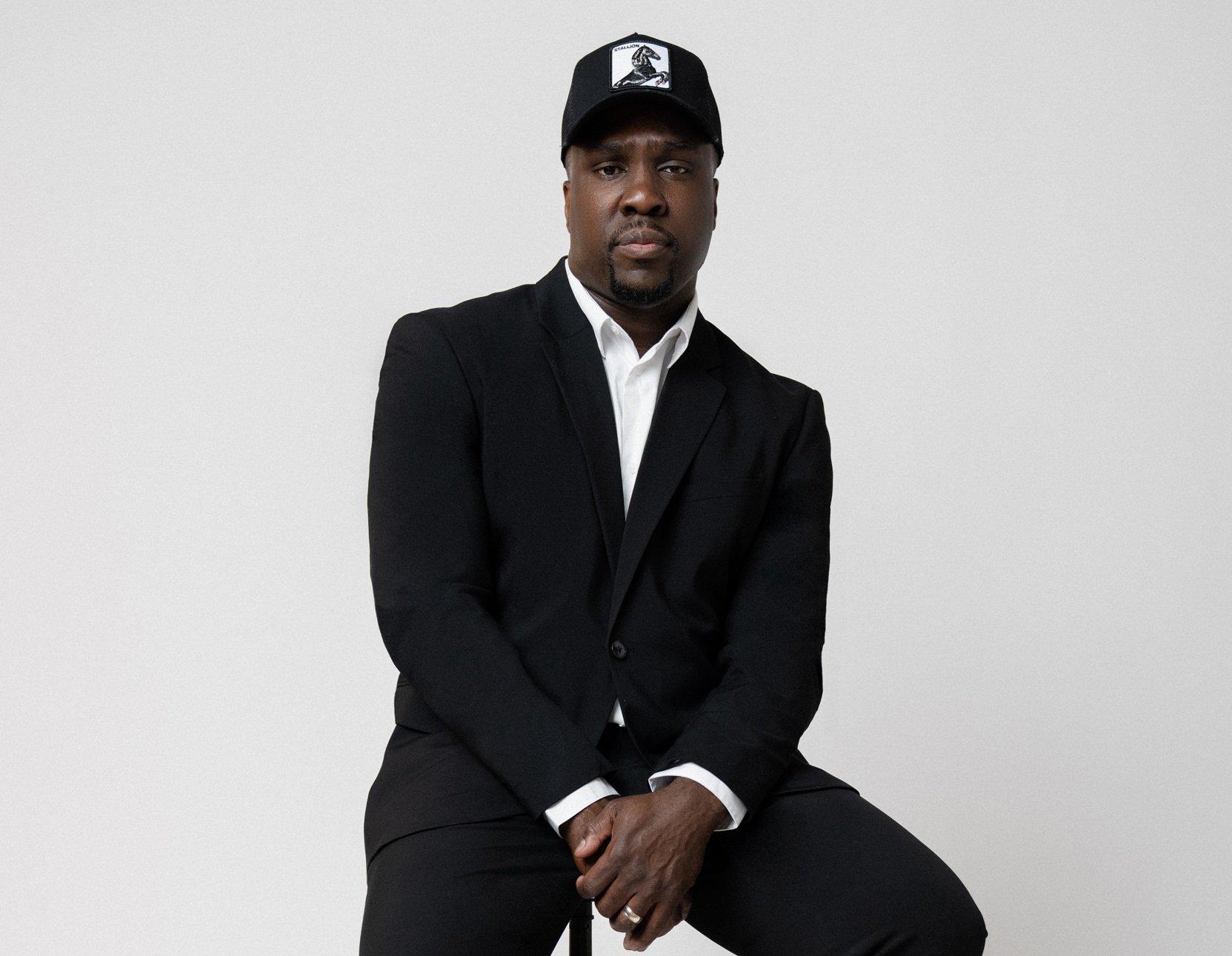
Photo: Oye Diran
interview
Meet Derrick Hodge, The Composer Orchestrating Hip-Hop's Symphony
From Nas' 'Illmatic' to modern hip-hop symphonies, Derrick Hodge seamlessly bridges the worlds of classical and hip-hop music, bringing orchestral elegance to iconic rap anthems.
Over the last 50 years, hip-hop culture has shown it can catalyze trends in fashion and music across numerous styles and genres, from streetwear to classical music. On June 30, Nas took his place at Red Rocks Amphitheater in a full tuxedo, blending the worlds of hip-hop and Black Tie once again, with the help of Derrick Hodge.
On this warm summer eve in Morrison, Colorado, Nas performed his opus, Illmatic, with Hodge conducting the Colorado Symphony Orchestra. The show marked a belated 30-year celebration of the album, originally released on April 19, 1994.
As Nas delivered his icy rhymes on classics like "N.Y. State of Mind," "Memory Lane (Sittin' in da Park)," and "Halftime," the orchestra held down the beat with a wave of Hodge's baton. The winds, strings, and percussion seamlessly transitioned from underscoring Nas's lyrics with sweeping harmonic layers to leading melodic orchestral flourishes and interludes. For the album's final track, "Ain't Hard to Tell," the orchestra expanded on Michael Jackson's "Human Nature," expertly sampled originally by producer Large Professor.
Derrick Hodge is a pivotal figure in modern music. His career spans writing and performing the famous bassline on Common's "Be," composing for Spike Lee's HBO documentary "When the Levees Broke: A Requiem in Four Acts," and his own solo career that includes his latest experimental jazz album, COLOR OF NOIZE. Hodge also made history by bringing hip-hop to the Kennedy Center with orchestra accompaniments for Illmatic to celebrate the album's 20th anniversary in 2014.
"That was the first time hip-hop was accepted in those walls," Hodge says sitting backstage at Red Rocks. It was also the first time Hodge composed orchestral accompaniments to a hip-hop album.
Since then, Hodge has composed symphonic works for other rappers including Jeezy and Common, and is set to deliver a symphonic rendition of Anderson .Paak's 2016 album, Malibu, at the Hollywood Bowl in September.
Hodge's passion for orchestral composition began when he was very young. He played upright bass by age seven and continued to practice classical composition in his spare moments while touring as a bassist with Terence Blanchard and Robert Glasper. On planes. In dressing rooms. In the van to and from the gig.
"It started as a dream. I didn't know how it was going to be realized. My only way to pursue that dream was just to do it without an opportunity in sight," Hodge says. "Who would've known that all that time people were watching? Friends were watching and word-of-mouth."
His dedication and word-of-mouth reputation eventually led Nas to entrust him with the orchestral arrangements for Illmatic. He asked Hodge and another arranger, Tim Davies, to write for the performance at the Kennedy Center.
"[Nas] didn't know much about me at all," Hodge says. "For him to trust how I was going to paint that story for an album that is very important to him and important to the culture, I have not taken that for granted."
Read more: How 'Illmatic' Defined East Coast Rap: Nas’ Landmark Debut Turns 30
Those parts Hodge wrote for the Kennedy Center are the same parts he conducted at Red Rocks. Over a decade later, he channels the same drive and hunger he had when he was practicing his compositions between gigs. "I hope that I never let go of that. I feel like these opportunities keep coming because I'm approaching each one with that conviction. Like this could be my last."
Before this latest performance, GRAMMY.com spoke with Hodge about bridging the worlds of classical and hip-hop, influencing the next generation of classical musicians, and how his experience as a bassist helps him lead an orchestra.
Throughout history, orchestral music has been celebrated by the highest echelons of society, whereas hip-hop has often been shunned by that echelon. What is it like for you to bring those two worlds together?
I love it. I've embraced the opportunity since day one. I was a young man showing up with Timberlands on and cornrows in my hair, and I knew the tendency to act and move in a certain perception was there. I knew then I have to represent hope in everything I do. I choose to this day to walk with a certain pair of blinders on because I feel like it's necessary. Because of that I never worry about how the classical world perceives me.
Oftentimes I'll stand before them and I know there may be questions but the love I show them, what I demand of them, and how I show appreciation when they take the music seriously…almost every situation has led to lifelong friendships.
I believe that's been part of my purpose. It's not even been to change minds or change perceptions. In serving the moment, even when people have preconceptions, they're in front of me playing music I wrote. How do I serve them best? How do I bring out the best in them just like I'm trying to bring out the best in the storyline of a hip-hop artist that may not relate to their story at all? The answer is just to be selfless. That's eliminated the distraction of trying to convince minds.
With that unifying principle, would you consider conducting the orchestra the same thing as playing bass with Robert Glasper?
The way I try to be selfless and serve the moment, it's no different. Maybe the skillset that's required. For example, conducting or working within a framework of composed music requires a certain way of making sure everybody's on the same page so we can get through these things on time and keep going. But I serve that moment no differently than when myself and Robert Glasper, Chris Dave, Casey Benjamin RIP, are creating a song in the moment.
I actually don't even think about how one thing is affecting the other. I will say the beauty of the bass and the bassists that have influenced me — from Ron Carter to the great Marcus Miller, Victor Wooten — is the way they can stand out while never abandoning the emotion of the moment. Remembering what is perceived as the role of the bass and how it glues things in a unique way. Harmonically and rhythmically. Being aware of the responsibility of being aware of everything.
I think that's one thing that's carried over to orchestrating and thinking about balances and how to convey emotion. I think some things are innate with bassists. We're always navigating through harmony and having a conversation through a lens of placement with drums. Placement with the diction if they're singers or rappers. There are a lot of decisions bass players are making in the moment that we don't even think about. It's just secondhand. But it's how are we serving what's necessary to make the conversation unified. I think that's one thing that's served me well in composition.
What's one song you're particularly excited to dive into for the Anderson .Paak arrangements?
So I'm intentionally not thinking in that way because we decided to treat it like a movie. Start to finish no matter what. With that in mind, I'm trying to approach it as if the whole thing is an arcing story because I didn't realize the succession of how he placed that record was really important to him.
**Hip-hop is often a very minimalist genre while an orchestra is frequently the opposite with dozens of instruments. How do you maintain that minimalist feel when writing orchestra parts for hip-hop albums like Illmatic?**
I'm so glad you asked that because that was the biggest overarching thing I had to deal with on the first one. With Nas. Because Illmatic, people love that as it is. Every little thing. It wasn't just the production. Nas's diction in between it, how he wrote it, how he told the story, and the pace he spoke through it. That's what made it. So the biggest thing is how do I honor that but also try to tell the story that honors the narrative of symphonic works? [The orchestra is] fully involved. How do I do things in a way where they are engaged without forcing them?
Illmatic was a part of my soundtrack. So I started with the song that meant the most to me at that time: "The World is Yours." That was the first piece I finished, and I emailed Pete Rock and asked "How is this feeling to you?" If the spirit of the song is speaking to him then I feel like this is something I can give to the people no matter how I feel about it. And he gave the thumbs up.
So instead of overly trying to prove a point within the flow of the lyrics, how do we pick those moments when the orchestra is exposed? Let them be fully exposed. Let them tell a story leading into that. Make what they do best marry well into what Nas and the spirit of hip-hop and hip-hop sampling do best. And then let there be a dance in between.
That first [Illmatic] show was a great experiment for me. I try to carve out moments whenever I can. Let me figure out what's a story that can combine this moment with this moment. That's become the beauty. Especially within the rap genre. To let something new that they're not familiar with lead into this story.
*Derrick Hodge conducts the Colorado Symphony Orchestra at Red Rocks* | Amanda Tipton
The orchestra is just as excited to play it as Nas is to have them behind him.
And that reflects my story. I try to dedicate more time to thinking about that, and that normally ends up reciprocated back in the way they're phrasing. In the way they're honoring the bowings. In the way they're honoring the breaths that I wrote in for them. They start to honor that in a way because they know we're coming to try and have a conversation with these orchestras. That's one thing I try to make sure no matter what. It's a conversation and that goes back to the moment as well.
I've seen other composers put an orchestral touch on hip-hop in recent years. For example, Miguel Atwood-Ferguson wrote orchestral parts to celebrate Biggie's 50th birthday. Would you say integrating an orchestra into hip-hop is becoming more popular?
It has become popular, especially in terms of catching the eyes of a lot of the different symphonies that might not have opened up their doors to that as frequently in the past. These opportunities — I appreciate the love shown where my name is mentioned in terms of the inception of things. But I approach it with a lot of gratitude because others were doing it and were willing to honor the music the same. There are many that wish they had that opportunity so I try to represent them.
With these more modern applications of orchestral music, I feel like there will be an explosion of talent within the classical realm in the next few years. Kids will think it's cool to play classical again.
The possibility of that just brings joy to me. Not just because it's a spark, but hopefully the feeling in the music they relate to. Hopefully there is something in it, aside from seeing it done, that feels that it relates to their story. I have confidence if I'm true to myself, hopefully, each time in the music it's going to feel like it's something relevant to the people. The more I can help foster platforms where people are free to be themselves, and where they can honor the music—I hope that mentality becomes infectious.
More Rap News

Ice Spice Is The Drill Queen On 'Y2K!': 5 Takeaways From Her Debut Album

Watch Young MC Win Best Rap Performance In 1990

On Rakim's 'G.O.D's Network (REB7RTH)' The MC Turned Producer Continues His Legacy With An All-Star Cast

5 Ways Mac Dre's Final Living Albums Shaped Bay Area Rap

Denzel Curry Returns To The Mischievous South: "I've Been Trying To Do This For The Longest"
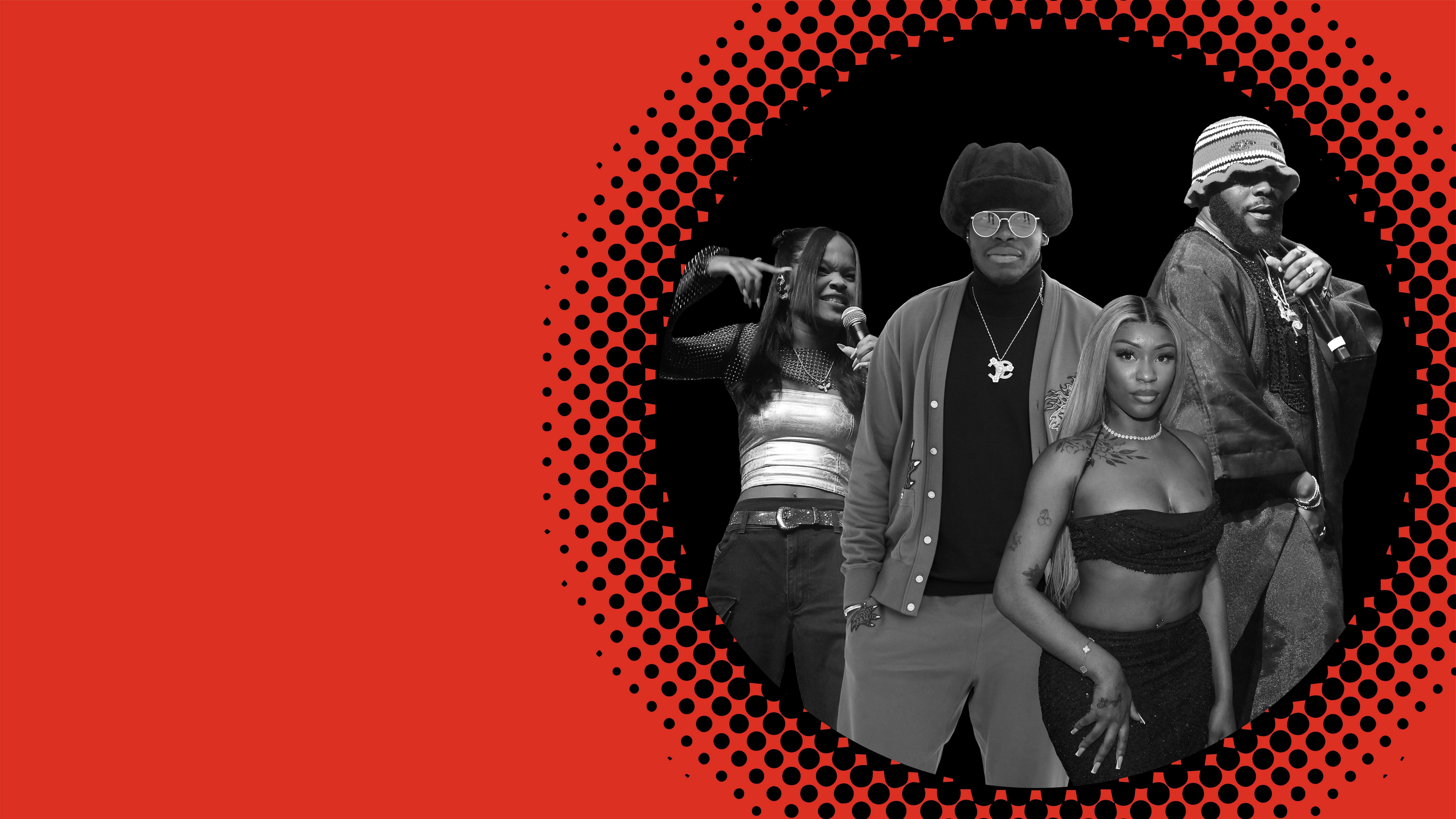
Photos: Taylor Hill/Getty Images; Stephane Cardinale - Corbis/Corbis via Getty Images; Dave Benett/Getty Images for The Standard London; Paras Griffin/Getty Images
list
10 Artists Changing The Face Of Drill: Ivorian Doll, Bobby Tootact & More
While Cash Cobain and Ice Spice bring drill music even further into the mainstream, a new generation of artists are evolving the sound of the genre. From S.Pri Noir and 163Margs, to Lismar and Jay Hound, these 10 acts should be added to your playlist.
Originating in the early 2010s on the southside of Chicago, the hip-hop subgenre drill has transcended borders to become a global phenomenon.
Characterized by a menacing and dark energy, drill music sets itself apart from traditional rap and hip-hop through its violent, aggressive lyrics and undertones. Drill music incorporates slower, heavier beats that often blend distorted 808 basslines, dark synths, and trap-style hi-hats.
The gritty, lawless sound, pioneered by artists like King Louie, Chief Keef, G Herbo and GRAMMY-award winner Lil Durk, remains at the core of the drill. Their influence is spreading to more mainstream acts like Cash Cobain — whose melodic, sultry "Attitude" exemplifies sample drill and landed him at No. 25 on Billboard's Hot Rap Songs — and Ice Spice, whose bold and perky lyrics contrast drill beats. As a whole, these artists are proving that drill is more than just graphic and horrid lyrical stories; it can be fun and even make you feel like a baddie.
Variations on drill music can be heard in regions such as South America, Africa, and Europe. The controversial but incredibly popular UK drill, which was born in the south London neighborhood of Brixton, draws many aesthetic influences from Chicago drill while maintaining its own stylistic differences. Where Chicago drill is heavily influenced by trap music, UK drill can be seen as a type of British gangsta rap, or "road rap." Young UK artists like Digga D and Central Cee have taken over the genre, both scoring entries on the Billboard chart, and with Central landing features with Drake and Lil Baby.
A new generation of drill rappers are continuing to evolve the sound of the genre by combining drill beats and lyrics with a wide range of influences. Read on to learn about 10 budding drill artists whose innovative sounds and diverse perspectives are evolving the global drill landscape.
Explore More: Drill Music Is On The Rise Around The World. Can Latin Drill Take Over Next?
Kenzo B
When it comes to vocal adaptability, attention to detail, and charisma — Kenzo B has got it. The Bronx-born rapper has quickly risen in prominence in New York's drill music scene following 2022 singles "Bump It" and "The Realest," both of which showcased her raw energy and talent.
The self-proclaimed "Queen of Bronx drill" continues to refine her rapid-fire rhymes while maintaining a fierce competitiveness, setting her apart in the male-dominated drill space. In April, Kenzo B teamed up with Harlem rapper Bianca Bonnie to drop their ultra-femme anthem "What You Talkin Bout?"
Wolfacejoeyy
Known for his sexy drill singalongs, Wolfacejoeyy is one of the most exciting rising rappers from NYC’s "forgotten borough," Staten Island. The 21-year-old seamlessly weaves hooky, charismatic rhymes into signature Staten-style instrumentals. On songs like the viral "cake" and "wya," Joeyy taps into an alter ego that teeters between hopeless romantic and relentless f—boy, backed with dynamic hats and a heavy bass.
His highly-anticipated 13-track debut album Valentino, dropped last month and includes a feature from R&B singer Reuben Aziz and production from "Power" actor Michael Rainey Jr., who raps as WhereIs22.
S.Pri Noir
Born to a Senegalese mother and father from Guinea-Bissau, S.Pri Noir is based in France. Despite rapping in French, hip-hop artist S.Pri Noir's music is slowly transcending borders — grabbing the attention of audiences worldwide.
S.Pri Noir’s 2018 debut album Masque Blanc reached No. 18 on the Top Albums chart in France. Earlier this month, he delivered a thrilling freestyle on "On The Radar Radio," channeling his inner Cash Cobain. After a recent Instagram post, fans are speculating a potential collaboration between the two artists will drop soon.
S.Pri Noir represents the next big market in drill: Africa. Many budding artists in the genre, especially from Europe, are second or third-generation African immigrants.
Ivorian Doll
German British rapper Ivorian Doll is making a name for herself in the UK drill scene. Boldly claiming the title "Queen of Drill," she's carving out a unique niche with explosive lyrics, drill-infused tension, and undeniable pop appeal. Each of her anthems is a potent cocktail of drama and attitude, highlighting her razor-sharp signature style that's firmly anchored in unfiltered, hard-hitting lyricism.
The 26-year-old rapper debuted in 2018 as part of a duo, dropping the infectious drill track "The Situation." Since embarking on her solo journey, she's continued to captivate audiences with standout releases like "Queen of Drill," "Daily Duppy" and the buzz-worthy song "Rumour." Her ascent in the drill scene exemplifies a fresh voice bringing new energy to the genre, blending cultural influences with raw talent and unapologetic star quality.
Bobby Tootact
Harlem rapper Bobby Tootact is known for remixing popular Afro-Caribbean songs — from Afrobeats bangers such as Wizkid’s "Joro" to dancehall like Teejay’s "Drift" — into drill tracks with overtly rough lyrics. On 2023's "Real Facts" (produced by go-to mixer Lowkeymali), Bobby raps about gun violence while sampling Wizkid’s popular Afrobeats dance track "Ojuelegba."
As the child of Senegalese immigrants, Bobby's music reflects a fusion of his cultural heritage and his upbringing in Harlem. This combination allows him to create a distinctive musical identity that resonates with fans of multiple genres while merging two completely different musical worlds.
163Margs
Blending gritty lyrics with infectious beats, Nottingham's very own 163Margs has struck a chord with listeners craving traditional UK drill music from a young artist. Margs, who debuted in 2023, has already collaborated with UK heavyweights like Digga D, Bandokay, and Blanco. His debut single "Hide and Seek" propelled him into the spotlight, showcasing his raw talent and captivating flow.
At first listen, his 2024 single, "Barbies" can be confused as an ode to beautiful women, with lyrics like: "All of them Barbie pretty." Listeners later realize the song is actually about guns and street life. "The opps are wet and there's no disagreement / Ayy / fill up the wap / put teeth in."
Odumodublvck
Nigerian rapper and singer Odumodublvck is crafting a lane for himself with an alluring Afro-grime and Afro-drill sound. As a member of the hip-hop collective Anti World Gangstars, Odumodublvck creates high-energy music which features catchy, repetitive lyrics in Pidgin English and his Native Nigerian language (Igbo).
His latest project, EZIOKWU, dropped in October 2023 and includes collaborations with acclaimed artists like Fireboy DML, Wale, and Amaarae — further cementing his position as a rising star in the evolving Nigerian music landscape.
Jay Hound
Jay Hound is an upcoming drill artist hailing from a section of Manhattan's Upper West Side neighborhood and catapulted into the spotlight via his 2023 single "UKRAINE."
A collaboration with his Sweepers labelmate Jay5ive, the track features deep and vibrating bass, and garnered over seven million views on YouTube and nearly 30 million streams on Spotify. He even released an Afro-drill version of the song, which deconstructs the grittiness of the original drill track for a more light and playful dance sound.
Lismar
Dominican singer/songwriter Lismar is dominating the Dominican urban music scene with her contemporary hip-hop and drill rap. Gaining recognition on the Puerto Rican platform Freestyle Mania, Lismar's creativity and distinctive sound of which infuses both Latin and hip-hop music has earned her a growing fan base and a deal with Roc Nation.
In her new released tracks "Delincuente Con Traje" and "BZRP Music Session #60," she captivates listeners with her powerful flow and impactful lyrics that translate to "I look calm / but I was raised on the corner" and "If they close the door / I knock down the window." The rapper dropped her latest single "Mi Primer Concierto," a softer record that seamlessly integrates her Dominican heritage with rap.
Dee Billz
New York-based rapper, Dee Billz, combines bold and unapologetic lyrics while also toying with a Jersey club sound in his 2023 breakout hit "Thootie." The single took the internet by storm and racked up more than a million views across TikTok and YouTube.
Last year, the drill artist collaborated with fellow New Yorker rapper’s Kyle Richh, Jenn Carter, and Tata to release "Stomp Stomp," a single that reimagines Soulja Boy's "Crank That" in a drill style.
Latest Rap News & Music

Ice Spice Is The Drill Queen On 'Y2K!': 5 Takeaways From Her Debut Album

Watch Young MC Win Best Rap Performance In 1990

On Rakim's 'G.O.D's Network (REB7RTH)' The MC Turned Producer Continues His Legacy With An All-Star Cast

5 Ways Mac Dre's Final Living Albums Shaped Bay Area Rap

Denzel Curry Returns To The Mischievous South: "I've Been Trying To Do This For The Longest"
